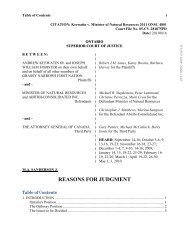Canadian case law: Arora et al v Whirlpool Canada LP and ...
Canadian case law: Arora et al v Whirlpool Canada LP and ...
Canadian case law: Arora et al v Whirlpool Canada LP and ...
- No tags were found...
You also want an ePaper? Increase the reach of your titles
YUMPU automatically turns print PDFs into web optimized ePapers that Google loves.
The Bill aims to improve the accuracy of consumerinformation <strong>and</strong> to introduce saf<strong>et</strong>y measuresproportionate to the risks associated withthese products. 71 If enacted, it will tighten theregulation of natur<strong>al</strong> he<strong>al</strong>th products in NewZe<strong>al</strong><strong>and</strong>.• Tobacco Regulation: The current government iscommitted to making New Ze<strong>al</strong><strong>and</strong> smoke-free by2025. 72 A recent government inquiry into th<strong>et</strong>obacco industry has recommended interventionssuch as banning cigar<strong>et</strong>te vending machines, prohibitingshop displays of tobacco, plain packaging<strong>and</strong> reducing duty-free <strong>al</strong>lowances. 73• Alcohol Regulation: The Alcohol Reform Bill 2010was drafted in response to the New Ze<strong>al</strong><strong>and</strong> LawCommissions 2010 report entitled Alcohol in OurLives: Curbing the Harm. 74 Alcohol causes majorsoci<strong>al</strong> <strong>and</strong> he<strong>al</strong>th-related harm to consumers inNew Ze<strong>al</strong><strong>and</strong>. The Bill aims to reduce this harmby measures such as tighter liquor licensing rules<strong>and</strong> changing the leg<strong>al</strong> purchasing age. However,many of the recommendations in the Law Commissionreport, such as price control <strong>and</strong> strictercontrol of <strong>al</strong>cohol advertising, are not adopted bythe Bill.Kate TokeleySenior LecturerVictoria University of Wellington, New Ze<strong>al</strong><strong>and</strong>A version of this article is forthcoming in J M<strong>al</strong>bon <strong>and</strong>L Nottage (eds) Consumer Law <strong>and</strong> Policy in Austr<strong>al</strong>ia<strong>and</strong> New Ze<strong>al</strong><strong>and</strong> Federation Press, 2013.Footnotes1. See, for example, G Austin “The Regulation of ConsumerCredit Products: An Examination of Baseline Assumptions”in S Frankel (ed) Learning from the Past Adapting for theFuture: Regulatory Reform in New Ze<strong>al</strong><strong>and</strong> Lexis Nexis,Wellington, 2011 p 295.2. The Saskatchewan statute on which the New Ze<strong>al</strong><strong>and</strong> legislationis modeled is c<strong>al</strong>led the Consumer Product Warranty <strong>and</strong>Liability Act 1978. It has subsequently been replaced by theConsumer Protection Act 1996 (Saskatchewan).3. For example, the Electricity <strong>and</strong> Gas Complaints Commission,The Office of the Banking Ombudsman, The Insurance <strong>and</strong>Savings Ombudsman <strong>and</strong> the New Ze<strong>al</strong><strong>and</strong> Medic<strong>al</strong> AssociationCode of Ethics available at: www.nzma.org.nz/sites/<strong>al</strong>l/files/CodeOfEthics.pdf.4. Disputes Tribun<strong>al</strong> Act 1988 (NZ).5. See the Smoke-free Environments Act 1990 (NZ), the S<strong>al</strong>e ofLiquor Act 1989 (NZ) <strong>and</strong> the Medicines Act 1981 (NZ).6. The government released a statement on regulation entitled:B<strong>et</strong>ter Regulation, Less Regulation in 2009. The statementindicates that the government has a preference for minim<strong>al</strong>leg<strong>al</strong> intervention in the mark<strong>et</strong> place. See Hon Bill English<strong>and</strong> Hon Rodney Hide “Government Statement on Regulation:B<strong>et</strong>ter Regulation, Less Regulation” 17 August 2009 availableat: www.treasury.govt.nz.7. The Organisation for Economic Co-operation <strong>and</strong> Development(OECD) The Consumer Policy Toolkit 2010 was devisedby the OECD with significant input from New Ze<strong>al</strong><strong>and</strong>offici<strong>al</strong>s. It is regularly used by the Ministry of ConsumerAffairs in the development of policy. See, for example,Ministry of Consumer Affairs Consumer Law Reform Addition<strong>al</strong>Paper — February 2011 Consumer Information St<strong>and</strong>ards(2011).8. These findings provide a ration<strong>al</strong>e for some of the morepatern<strong>al</strong>istic consumer <strong>law</strong> reform in areas such as gambling,smoking, <strong>al</strong>cohol consumption, over-indebtedness <strong>and</strong> r<strong>et</strong>irementsavings. See gener<strong>al</strong>ly T Irwin Implications of Behaviour<strong>al</strong>Economics for Regulatory Reform in New Ze<strong>al</strong><strong>and</strong> (SapereResearch Group, 2010); New Ze<strong>al</strong><strong>and</strong> Ministry of EconomicDevelopment, Behaviour<strong>al</strong> An<strong>al</strong>ysis for Policy: New lessonsfrom economics, philosophy, psychology, cognitive science <strong>and</strong>sociology (2006). There is a substanti<strong>al</strong> body of literature onthe implications of behaviour<strong>al</strong> economics to <strong>law</strong>. See, forexample, C Sunstein “Empiric<strong>al</strong>ly Informed Regulation” (2011)U. Chi. L. R. 1349 at 1350–361; R B Korobkin & T S Ulen“Law <strong>and</strong> Behaviour<strong>al</strong> Science: Removing the Ration<strong>al</strong>ityAssumption from Law <strong>and</strong> Economics” (2000) 88 C<strong>al</strong>. L. Rev1051: C Joll <strong>et</strong> <strong>al</strong>, “Law <strong>and</strong> Behaviour<strong>al</strong> Approach to Law <strong>and</strong>Economics” (1998) 50 Stan. L. Rev 1471.9. Comp<strong>et</strong>ition <strong>and</strong> Consumer Act 2010, Sch 2; M<strong>al</strong>bon <strong>and</strong>Nottage, Ch 1 of this volume.10. Above, n 6.11. “Consumer credit contracts” are defined as those that are“primarily for person<strong>al</strong>, domestic or household purposes”(CCCFA s 11).12. Credit Contracts <strong>and</strong> Consumer Finance Act 2003 (NZ) s 7(2).13. Apart from the provisions in respect of oppressive creditcontracts, the CCFA leaves the regulation of credit provided forbusiness purposes largely to the common <strong>law</strong>.14. Credit Contracts <strong>and</strong> Consumer Finance Act 2003 (NZ) Sch 1.15. Credit Contracts <strong>and</strong> Consumer Finance Act 2003 (NZ) ss 41–44(unreasonable fees), ss 55–59 (unforeseen hardship), ss 117–131(oppressive credit contracts).16. J Legge <strong>and</strong> A Heynes Beyond Reasonable Debt Part 1: ABackground Report on the Indebtedness of New Ze<strong>al</strong><strong>and</strong>Families (Research Report 8/08, Families Commission <strong>and</strong>R<strong>et</strong>irement Commission, Wellington, December 2008), availableat www.familiescommission.govt.nz. Ministry of ConsumerAffairs Review of the Operation of the Credit Contracts<strong>and</strong> Consumer Finance Act 2003 (September 2009) availableat www.consumeraffairs.govt.nz.17. See M<strong>al</strong>bon, Ch 9 of this volume.austr<strong>al</strong>ian product liability reporter October 2012 307
















